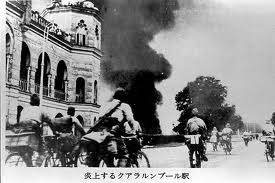Bandit Saints of Java: How Java's eccentric saints are challenging fundamentalist Islam in modern Indonesia.
Author: George Quinn
Author: George Quinn
A famous message asserts that Sukarno's father was an avid reader of the Hindu scripture, Mahabaratha. He was so fascinated with the character Karna that he named his son after his hero. Karna was a good man in the father's eyes but on the wrong side of the war. So, the father added the prefix 'Su' to his son's name. Su in Sanskrit, it seems, indicated goodness. Hence, his son was named Sukarno -the good Karna. Sukarno went on to name his daughter Sukarnoputri - daughter of the good Karna.
This shows the extent of the influence Hinduism had on the psyche of people in Indonesia. After all, the name 'Indonesia' in all its glory would imply the land of Hindus. Despite boasting of being the country with the largest Muslim population on the planet, I do not think they are in any hurry to change their country's name anytime soon.
A radical fire-brand kind of conservative Islam is taking over worldwide. Thanks to the Saud family of the Kingdom of Saudi Arabia, in cahoots with the winning side of the World War 2, in exchange for land for oil exploration in the Arabia Peninsula, they got a free hand to spread their kind of Islam -Wahabism- to the then up and coming post-colonial nations.
Interestingly, in the 16th century, Islam spread to this region in almost a similar fashion. Enlightened individuals, after embracing the recently received good news from the Arabian deserts, evangelists made it their life ambition to spread the good word to the heathens across the continents. Many towering figures, as they were tall of Middle Eastern stock, much bigger than the local men, impressed the local populace. The locals had had contact with Muslim traders before and, therefore, received these preachers with open arms. They came to their Indonesian shores with many tall tales of a loving God in the skies. In their zest to earn brownie points with their God, these saints did dakyah work to convert the Hindu land with Islamic do's and don'ts. The locals embraced their teachings and continued revering these saints even after their deaths.
The book is a collection of the first-hand account of an academician who had visited many of the tombs erected around Java Island to commemorate many of their Muslim saints who had walked the land. Many of these saints led larger-than-life lives. Some are said to have possessed magical skills. One of them was even a flamboyant homosexual. One lived and died in a fire with his faithful dog.
For generations, this practice of honouring their dead saints has been happening in the archipelago (including Malaysia). Remembering them, making an annual pilgrimage to their gravesites, and performing certain rituals are norms. And it is big business. It draws many economic activities to these otherwise remote places.
With the general worldwide trend of orthodoxy in Islam these days, purists view such practices as idolatry and draw ire from the younger members of the country.
The country can roughly be divided into two sub-cultures of Muslims - the santris and the abangan. The word 'santri' is probably a derivative of the Sanskrit word 'shastri' - a person with higher learning. They emphasise purity, exclusivity and scripture-based authority. They look upon their Middle Eastern brothers for validation in dressing, arts and education. The abangans are inclusive and tolerant of including Java's old traditions in their day-to-day lives.
A point to note is that these graves are by no means the exclusive domain of Indonesian Muslims. There is even a site where its saint is said to have Chinese heritage. Indonesian Chinese too frequent some of these sights.
It is said that the Indonesian mass killing or genocide of 1965 is said to have its roots in this schism as well. The sastris leaned toward Suharto, the Army and their voluntary vigilante civilians. The abangans, by their nature of inclusivity, were the satris' target. Their other targets were leftists, Chinese, communist sympathisers and women movements.
Fast forward to the present, these holy sites are still functioning as usual. The monetary driven from its activity is just too good to resist. It draws in local and foreign exchange and puts food on their table. These areas too get other incidental benefits like better roads and modern facilities to their vicinity which would otherwise not come.
This work is licensed under a Creative Commons Attribution 4.0 International License.















